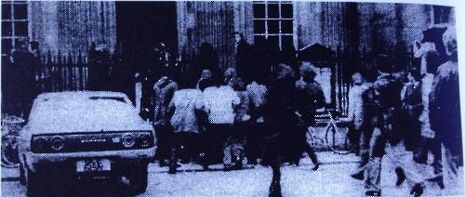It’s OK to criticise Cambridge
Cambridge is far from an ‘academically rigorous’ paradise

Since coming to Cambridge, I’ve been overwhelmed with the sense that I should be grateful to be here. Whether it’s complaining about the drinking society, whose misogynistic and abusive comments reduced me to tears, or suggesting three essays a week is unreasonable, I feel obliged to couple it with an apologetic reference to my eternal gratitude. The problem with this sentiment is that it’s disproportionately directed towards me as a state school girl on a bursary and other students who face various oppressions or come from lower down on the sociopolitical spectrum. There’s a feeling that we should be thankful that this esteemed institution has deemed us worthy of walking its hallowed halls. Through this, we not only entrench and legitimise elitism, but neglect the reality that we are here through our own merit, and our right to have a say. In much of the student press’ willful vilification of student campaigns, our sense of misplaced gratitude is weaponised and used to silence experiences of mistreatment and, perhaps more importantly, whitewash Cambridge’s highly problematic history.
Firstly, anyone citing Cambridge’s history as being grounded in “the ideal of an academically rigorous university” desperately needs to pick up a history book. Far from promoting “academic rigour”, Cambridge spent most of its long life as a glorified finishing school for the wealthy elite. Scholars were eligibile for a fellowship without a degree. Exams were as hard as those at most of the good schools in the country, showing no academic development was expected. Yet a fifth of undergraduates still failed them. At many colleges, students were given degrees without even having to sit exams, including King’s, whose Scholars were drawn exclusively from Eton. Whilst Eton was initially set up as a charitable institution, justifying this relationship, the admissions privileges and Amicabilis Concordia collaboration continued well into Eton’s ascent into an indisputable bastion of institutionalised educational inequality. Even today, the Provost at King’s is automatically appointed in an advisory role to Eton’s governing body.
As for pluralism and inclusivity, Cambridge has regularly had to be dragged into the next century kicking and screaming. Women couldn’t be full members of the University until 1948, with protests at prior attempts including maiming and decapitating female effigies before throwing them into Girton (at the time, it was a college established for female students – it’s distance was allegedly deliberate, part of an effort to prevent male students feeling ‘intimidated’ by the early female pioneers.) Whilst this could again be attributed to the attitude of the ages, the first batch of ‘male’ colleges to permit women to enter did so only in 1972 – and Magdelene only followed suit 25 years ago, in a change which prompted students and fellows alike to march through the streets with a coffin, fly the flag at half mast, and don black armbands in mourning at the ‘death’ of their college.
More recent history laughs in the face of the idea of Cambridge peddling pluralism and defending free speech – unless we ignore the utterly crucial role that protest plays in free, democratic expression. After the Garden House Riots of 1970, a protest against the Greek military government which disrupted a dinner Cambridge were hosting to promote tourism to Greece, jailed protestor Rod Caird described how “an attempt was made… to withhold my degree on the grounds that I had ‘brought the University into disrepute.’” An even more controversial case was that of Owen Holland, a student in 2012. Owen read out a poem during a speech by the visiting Education Minister. An entirely peaceful, legitimate, and powerful protest within the legal remit of freedom of expression – the university issued Holland with a suspension for seven terms in an action which Thomas Glave, a visiting fellow, called “an ugly lesson in repression.”
Cambridge was not built for me, and it was not built for many of us. It was built as a finishing school for the leaders of an empire which enslaved and tortured some students’ ancestors, a state which deemed the gender of others inferior and incapable, a Church which viewed their sexualities morally abhorrent. That time may be over but its scars and oppressions remain, often too recent or too personal for the emotional detachment and reasoned debate constantly demanded of us.
Campaigns, safe space meetings and protests are, and always have been, the weapons of the less privileged, the tools of change and revolution; glamourising formal debate and devil’s advocacy over it is an exercise in intellectual elitism. Until Cambridge learns to accept the voices of campaign groups, protestors and activists, it cannot call itself a true defender of free expression or pluralism. The fact is that if you feel the need to be venomous towards groups which clearly mean a lot to people and are not doing any active harm, then they’re not the problem; you are. You are achieving nothing but more pain, hatred and bitterness. Leave them be. Just by existing, they’re doing more good than you could ever realise.
 Interviews / ‘People just walk away’: the sense of exclusion felt by foundation year students19 April 2024
Interviews / ‘People just walk away’: the sense of exclusion felt by foundation year students19 April 2024 News / Controversy on the Cam: John’s spend almost 90 times more on rowing than other colleges19 April 2024
News / Controversy on the Cam: John’s spend almost 90 times more on rowing than other colleges19 April 2024 Theatre / The closest Cambridge comes to a Drama degree 19 April 2024
Theatre / The closest Cambridge comes to a Drama degree 19 April 2024 News / Corpus student left with dirty water for over six months21 April 2024
News / Corpus student left with dirty water for over six months21 April 2024 News / Emmanuel College cuts ties with ‘race-realist’ fellow19 April 2024
News / Emmanuel College cuts ties with ‘race-realist’ fellow19 April 2024





